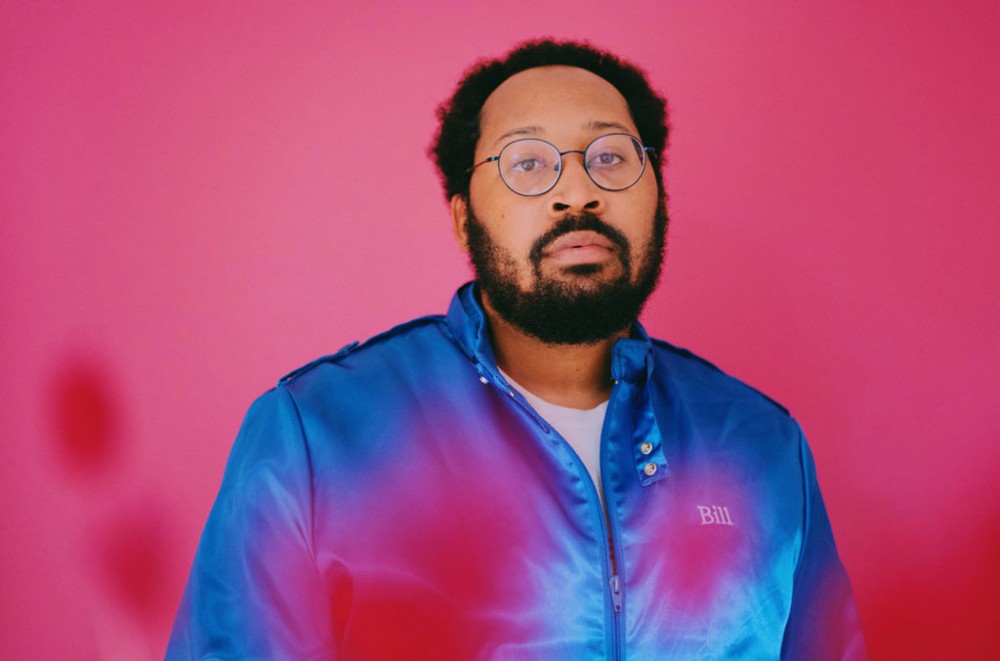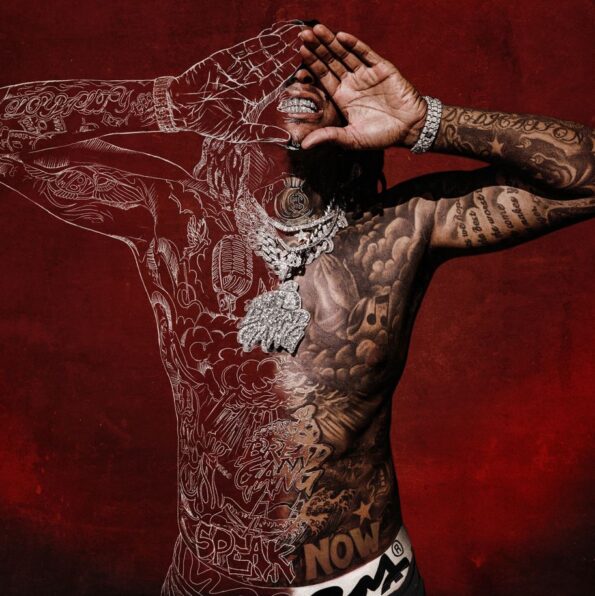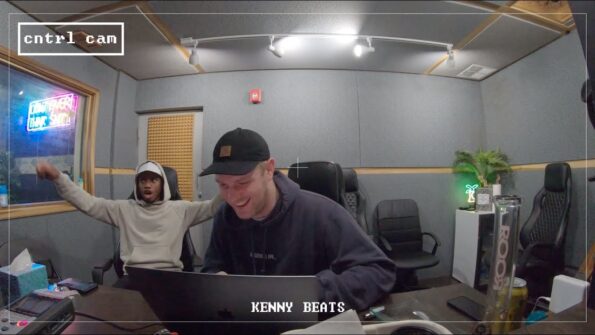He caught the ear of the National & released his debut EP March 13 on their Brasslands imprtint. Much more is in store.
Bartees Strange makes the music he wishes already existed.
Growing up alongside racism and isolation in rural Oklahoma, his family long found its voice in the jubilant music of black churches. That expanded to the Christian hardcore his parents let him listen to and later, aggressive secular rock like At the Drive In and Glassjaw in the mid 2000s.
Around the same time he figured out how to produce music out of a makeshift home set-up. By the time he made it to Brooklyn after college, he was finding inspiration in boundary-pushing artists from all over: Robyn, Burial, TV on the Radio, the Internet. He sang and played in bands across virtually every rock sub-genre. But something was missing.
After moving to Washington, D.C. to work for an environmental non-profit, Strange had an unlikely ah-ha moment watching a performance from one of his favorite bands. “I went to see The National play at the Anthem… It was an amazing show, but I remember thinking, ‘Damn, it’s pretty crazy this is D.C., Chocolate City, and I don’t see any people of color in the room. What if we took this music and reshaped it?'”
Strange’s debut EP calls on his unique musical backstory to reimagine old National standbys with the help of the band’s Aaron and Bryce Dessner, who released it on their indie imprint, Brassland. Say Goodbye to Pretty Boy takes its name from the National’s 2003 track “Murder Me Rachael,” and more importantly, sums up how he realized his potential: “When you’re in a band, there’s always something to hide behind. I was always the guitar player, singing backup… even singing in a hardcore band, it was super collaborative and I was afraid to admit I wanted more. To get to feeling comfortable releasing music under my own name, I had to say goodbye to being so precious. I had to say goodbye to that version of me.”
The five National covers are indeed stirring, but they’re just the beginning. Strange released two originals alongside Pretty Boy: the frisky post-punker “Hags” and most impressive, a twinkling nocturne called “Going Going,” deeply tied to Strange’s earliest, often darkest days. He’s prepping a debut album for later this year and the fact these didn’t make the cut is reason enough for your own indie rock reawakening.
In the meantime, here’s Bartees’ recent chat with Billboard.
So, a good place to start: How does one link up with the National and come to do an EP of covers for their label?
The National is one of my favorite bands of all-time. I’ve loved them since I was 14, 15 years old. Me and my buddy Carter — he’s the drummer in my band and all over this EP — would always joke around like, “Oh my god, why don’t we cover these songs? I would love to do something with them.” It was kind of a joke.
As much as I love the National, it’s tough when there’s not a lot of black people at these shows. It would be cool if one day there was a band as big as the National that looks a little more like me. On that stage, with the same amount of respect and the same type of career over such a long period of time… We’re not covering it note for note, but trying to tell a different story. I realized it fit into my bigger picture of what I’m trying to do musically: assert the contributions black people have made in this genre of indie rock and roll.
My friend Blake — he’s an artist who goes by the name Fusilier — is signed to Brassland and he was like, “Oh, you should tell National co-founder] Alec Hanley Bemis] about this.” Alec and I grabbed a drink. I told him about the band, sent him a couple of my originals, and boom-boom, it clicked really naturally. He was like, “We don’t have the capacity to do a full album run right now, because we’re working on the National’s album, but let’s do the EP.”
How did approach your vision of bringing black music into the National’s songs?
A lot of it was in the way the National] do their rhythm sections. I’m a huge house and dance music fan and there’s stuff the National does where I’m like, “Oh s–t, that’s a house vibe.” “About Today” is a great example… the kick pattern is friggin’ devastating. So I was like, let’s take that kick pattern, make it grimy, super-reminiscent of some old Detroit techno sh-t. Bring it back down to the root of what I see black people made to the music.
Another way we reclaimed the contributions of black people was frankly… I did it. I’m a black person from Mustang, Oklahoma who grew up in the woods and I love this music. My whole family is from the south. My mom grew up singing in the south. My whole family is jubilee singers. This is my legacy.
National singer Matt Berninger has such a distinctive baritone. What’s it like adapting your voice to his songs?
With all the music I was like, “Yo, the one thing you’re not gonna do is try to sound like the National.” Laughs.] No one can replicate this sh-t. It’s too f–king great. So I’m not gonna try to sing like Matt or play guitar and piano like Aaron and Bryce.
I have a pretty good range on the baritone so I was able to catch the notes, but it presented some interesting challenges. For example, most of my singing background is very much singing. I grew up singing in churches and my mom is an opera singer, so I was always singing with volume. But in a lot of National songs, Matt’s just kind of talking. Like on “About Today” or even “Lemonworld.” I tried to depend on the power of the song instead of the power of my voice.
Matt’s lyrics are interesting, too. They tend to be weirdly specific or even surrealist.
It’s easy for great singers to write not-great lyrics. Laughs.] It’s easy for good singers to be like, “Oh I’m singing the s–t out of this, so who cares what I’m singing?” But there’s something about the way Matt and the band write; they just bring so much out of the music.
Reading through the lyrics, there’s never a ton of words, which I love to see on rock songs, especially: repeating phrases, bringing you back to a central part of the song. I love the repetitions in “Mr November,” which we covered. I feel pressure in songs to be like, “Okay, first verse I say this thing, second verse I gotta say something else.” But in a lot of National songs, the first verse is the story. We may incrementally add to it throughout the song, but adding a whole new page to a story? Nah, let’s sit on this, let’s focus on it. That’s a really powerful, deliberate choice. I really respect that.
Why did you chose “Going Going” as your first original song to introduce yourself to this new audience?
I thought it was the best introduction of who I am. That song is about me growing up, leaving Oklahoma, and moving to the east coast. It’s about fear.
Someone asked me the other day, “What was it like to grow up in Oklahoma?” It’s like being so scared all the time that you don’t even know you’re scared, until you’re out of that situation and realize you’re finally free. Every day it was just tension — so much racial tension where I grew up. I didn’t realize how that fear shaped me, and it took a long time to find myself after leaving. “Going Going” addresses a lot of that.
The first line is, “Some days you’d find us inside with the lantern on, blood on the door sill, armor of god.” I grew up in a very traditional black Christian house, singing in churches all the time. With that lyric] I was trying to call back to Passover, putting blood of the lamb on your door so no one knocks and takes you away. I lived really close to a lot of Klansmen and a lot of wild people. I was trying to reference that — getting to the point where it was time to leave.
What can you tell us about the direction of your forthcoming debut album?
Well, I chose “Going Going” and “Hags”] to put on this because they don’t sound like the album. Laughs.] For the LP, I try to show how everything is connected: rap, country, hardcore, post-rock. To me and a lot of people of color who grew up making things, those genres are blurry. The lines don’t really make sense to me.
Listen to Say Goodbye to Pretty Boy below.



